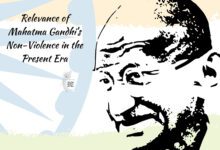Russian and Ukrainian battle casualties are appalling under nuclear doom—an in-depth analysis by Azam on Moscow’s church-state remarriage – exclusively for Different Truths.
Russian President Vladimir Putin’s statements on escalating the Ukraine war carry the implied threat of nuclear weapons, nailing scribes to their keyboards and provoking a rush on pharmacies for iodine to confront radiation. Although the nuclear threat has been massaged, it lurks above the Kremlin’s rhetorical mist. The dimension of religion is primarily reported as an unrelated series of events.
The remarriage of church and state in a Christian-majority secular state, three centuries after its divorce in the 1789 French Revolution, threatens the institutions which have nurtured human development.
The cloud of implicit nuclear doom rains hideous statistics of Russian and Ukrainian battle casualties.
The cloud of implicit nuclear doom rains hideous statistics of Russian and Ukrainian battle casualties. In 2023, it obscures a largely unperceived religious war being waged by a nation that, in 1918, renounced religion under Lenin’s decree, adopted state atheism and then, after its demolition, incorporated secularism within its new constitution.
Four years before Russia invaded Ukraine, The United States Institute of Peace, on October 31, 2018, warned that “The Russian government is increasingly seeking to use the Russian Orthodox Church to expand its influence in Ukraine, but the Kremlin is now meeting heightened resistance from many Ukrainian religious communities and particularly from the Ukrainian Orthodox Church-Kyiv Patriarchate. The crisis now threatens to split the Ukrainian Church from its historical ties with Moscow, potentially adding a dangerous religious dimension to the simmering war between Russia and Ukraine.”
The Kremlin’s attempt to retrieve prodigal Ukraine back into its orbit through religion failed when the Ukrainian Orthodox Church reacted by splitting from the Moscow Patriarchate.
Having failed to dominate Ukraine through religion, the attack had the support and approval of … the Russian Orthodox Church.
Then, on February 22, 2022, that dangerous dimension burst into screaming headlines when the Russian Army moved up from nibbling Ukraine to an outright invasion. Having failed to dominate Ukraine through religion, the attack had the support and approval of the Moscow Patriarchate governing the Russian Orthodox Church.
In EPRS — European Parliamentary Research Service’s — PE 729.355 of April 2022, Fearghas O’Beara writes: “…the Russian Orthodox Church… has strongly backed Putin’s war and has long provided theological and ideological justifications for his domestic and international actions. The church’s overtly political approach has contributed to deep divisions within the wider Orthodox world, including a formal split with the Ukrainian Orthodox Church and significant tensions with the Ecumenical Patriarchate of Constantinople.”
The Archbishop of Constantinople (present-day Istanbul) is considered first among equals, or primus inter pares, by the heads of several administratively independent or self–governing autocephalous local churches, which include the Moscow Patriarchate and the Orthodox Church of Ukraine.
Since the dissolution of the Soviet Union on December 26, 1991, 71 % of Russians now identify as Orthodox Christians.
Since the dissolution of the Soviet Union on December 26, 1991, 71 % of Russians now identify as Orthodox Christians. Accordingly, Vladimir Putin followed suit to openly declare his adhesion to the Moscow Patriarchate of the Russian Orthodox Church in 1993. Seventy-eight per cent of Ukrainians now identify as Orthodox Christians, flaunting their ecclesiastical independence in complete disregard of the Moscow Patriarchate’s ire.
On December 15, 2022, Willie Fautré, Director of Human Rights Without Frontiers, wrote of a massive dragnet in Ukraine to root out the Moscow Patriarchate’s influence peddlers, resulting in arrests and deportations. “At the same time, President Vladimir Zelensky gave orders to submit, within two months, to the Verkhovnaya Rada, a bill that would prevent any religious organisations’ affiliated with the centres of influence in Russia’ from operating in the country. Besides, a bill, which would allow seizing property from the canonical church, has recently been submitted to the Verkhovnaya Rada.”
Following the Putin government’s invasion of Ukraine, Pope Francis and the Archbishop of Canterbury, head of the Anglican church, held separate online meetings on March 16, 2022, with Russian Orthodox Patriarch Kirill. But to no avail — besides the standard officialese, nothing substantial has surfaced. If these meetings went back-channel, there is nothing to show.
… the Moscow Patriarchate and the Kremlin have united in a profane joint venture of church and state in the invasion of Ukraine.
Despite the secularism enshrined in the Russian constitution, the Moscow Patriarchate and the Kremlin have united in a profane joint venture of church and state in the invasion of Ukraine. The Moscow Patriarchate’s officialdom has repeatedly parroted the Kremlin’s official stance, describing the Ukraine invasion as a response to the West’s “geopolitical strategy aimed at weakening Russia.”
The chronology speaks for itself: the Ukrainian Orthodox Church declared its independence from the Moscow Patriarchate in 2019, and three years later is invaded by Russia, with Moscow’s Patriarch exhorting Russian forces and generously granting absolution to Russians killed in action, resurrecting an expired church practice to tighten flagging resolve in the rank and file of those, like Ezra Pound’s Mauberly, “walking eye-deep in hell, believing in old men’s lies.”
This blatant nexus between church and state in Russia also calls out the secular model of Christian majority nations, which had successfully separated church from state to achieve social and political progress. In 1776, the USA became the first explicitly secular state, followed by France, whose blood-drenched 1789 Revolution excised the church-state nexus that had kept their society in bondage.
…the October Revolution broke the deadlock, although it went to the other extreme concerning the spiritual needs of its citizens.
And in Russia, the October Revolution broke the deadlock, although it went to the other extreme concerning the spiritual needs of its citizens. These needs resurfaced with a vengeance after the 1991 dissolution of the USSR. Vladimir Putin has now harnessed them for his resurgent imperialism, cynically raising a storm of anti-fascist and anti-Nazi slogans to justify his invasion.
Another question that arises unbidden about the Moscow Patriarchate and Vladimir Putin is — who is using whom? Organised religious structures, at some stage, begin to see worldly primacy as a manifestation of spiritual superiority. They then feel justified in allying with profane forces to achieve ends they believe to be virtuous.
And authoritarian political regimes also keep sniffing around for a moral laundry from whichever religious structure is willing and available to prostitute itself.
Be that as it may, Lieutenant Colonel Vladimir Vladimirovich Putin, KGB, declared himself a practising, orthodox Christian in 1993. He became President in 1999, and although the involvement of the Moscow Patriarchate in his political career may be inferred, it is not publicly acknowledged.
The Putin-Patriarchate marriage of the sacred and the profane also reflects the Ronald Reagan-Pope John Paul II alliance…
The Putin-Patriarchate marriage of the sacred and the profane also reflects the Ronald Reagan-Pope John Paul II alliance, which mentored and helped to speed up the USSR’s impending implosion. President Putin has taken the core of this alliance and inverted it on the West after over three decades of hard work — professionally commendable!
It is disappointing that the involvement of the Moscow Patriarchate in the Ukrainian invasion is generally perceived as a stand-alone sideshow.
Putin has also set a precedent by flouting the United Nations Charter, article 2, paragraph 4: “All Members shall refrain in their international relations from the threat or use of force against the territorial integrity or political independence of any state, or any other manner inconsistent with the purposes of the United Nations,” introduced in the Nuremberg Principles of 1946, following the war crime trials of World War II.
Kemal Pasha Ataturk decided to heal this festering wound by renouncing it as a mosque and converting it into a museum.
Putin’s friend, Recep Tayyip Erdogan, President of Türkiye, had already flouted this law with impunity. By the erstwhile Right of Conquest, Istanbul’s Hagia Sophia Church had been appropriated as a mosque after May 29, 1453, the Fall of Constantinople, to the might of invading Turks. Kemal Pasha Ataturk decided to heal this festering wound by renouncing it as a mosque and converting it into a museum. Under the Erdogan administration, Turkiye’s highest court decided to resurrect the Right of Conquest and, once again, turn it into a mosque in 2020.
This is how The Siasat Daily reported the event.
“Hagia Sophia: Top Imam uses Ottoman’s sword during Friday sermon.
“Istanbul: Turkey’s iconic Hagia Sophia Grand Mosque reopened for worship on Friday for the first time in 86 years. Imam Erbaş read the special khutbah, or sermon, titled ‘Hagia Sophia: Sign of conquest, our trust in Fati̇h (Sultan Mehmet),’ before the collective prayer.
“When questioned why the sword was used in delivery (delivering) the sermon, Imam Erbas responded (by) saying that it is a tradition in mosques that are the symbols of conquest.”
https://www.siasat.com/hagia-sophia-top-imam-uses-ottomans-sword-during-friday-sermon-1928722/
For further reading on the significance of a khutbah delivered holding a sword, please read here: https://ottomanswords.com/what-does-the-tradition-of-khutbah-with-swords-mean/
There are countries which have implemented the modern and progressive model of secularism to create conditions that nurture human development.
As two outstanding examples among many, France and the USA extracted state governance from church meddling, and their citizens have been better off for it. India’s post-colonial progress is owed, in part, to an enlightened governing elite that let its diverse ‘churches’ and the state get on with what each does best.
Secular governance is structured to safeguard freedom of conscience…
Secular governance is structured to safeguard freedom of conscience and to maintain the principle of state neutrality. It seeks to interpret life independent of ecclesiastical injunctions and allows citizens to choose their own spiritual or ethical path. Historical universal values become a guiding force, not a faith community’s rulebook. Religious figureheads are neither influenced nor impactful in the state’s day-to-day affairs and its citizens’ lives.
The United Nations Development Programme (UNDP) issues regular Human Development Reports, a consensually normalised scale to measure the level of human development.
The countries highest on the human development index are secular democracies. Others snuggled in are those who, like Saudi Arabia, UAE and Qatar, cannot claim institutional parity with these states but have been able to thrive on the well-managed sale of a single natural resource. By contrast, the theocratic Iranian leadership is besotted with its self-image and is squandering the same resource to struggle for geopolitical relevance on the backs of its citizens.
Moscow’s church-state remarriage comes from a superpower…
Moscow’s church-state remarriage comes from a superpower whose influence, unlike that of Iran and its non-state proxies, is extensive and potent, based on the blatant use of apocalyptic might. It directly threatens the church-state separation engendered by the Renaissance, the Age of Enlightenment and the Reformation.
The Kremlin-Patriarchate cohabitation risks setting a hazardous precedent that puts the future of human development in jeopardy and desecrates the fundamentals of the very religion the President and the Patriarch purportedly serve.
Picture design Anumita Roy, Different Truths






 By
By
 By
By